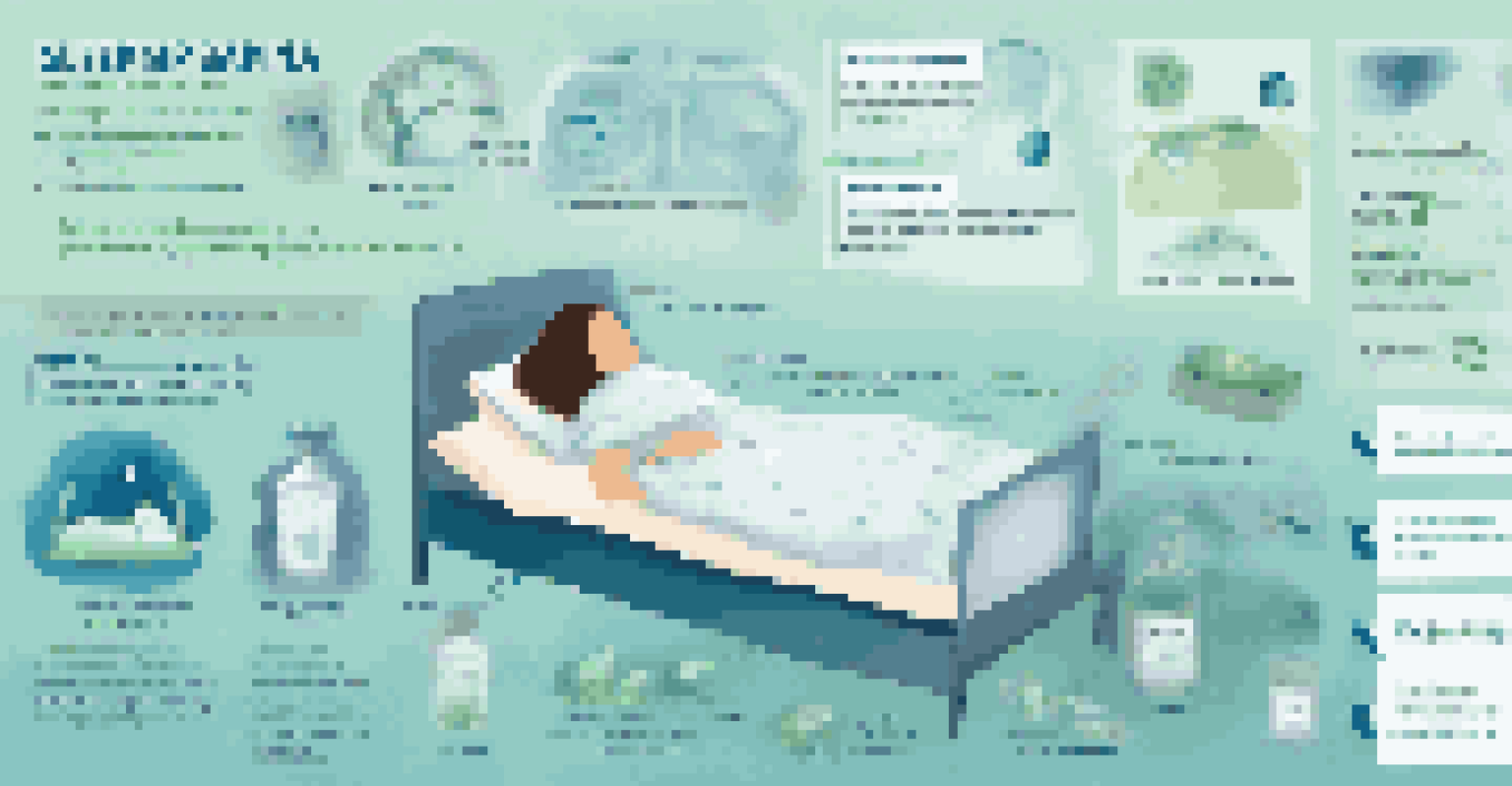Sleep Disorders: Understanding the Importance of Diagnosis

What Are Sleep Disorders and Why Do They Matter?
Sleep disorders encompass a range of conditions that disrupt normal sleep patterns. Common examples include insomnia, sleep apnea, and restless legs syndrome. Recognizing these disorders is crucial because they can significantly impact overall health and well-being.
Sleep is the best meditation.
When sleep is compromised, it doesn't just affect how tired you feel; it can lead to serious health issues like heart disease, obesity, and depression. In fact, studies show that inadequate sleep can impair cognitive function and slow down reaction times, much like being under the influence of alcohol.
Understanding the importance of sleep disorders emphasizes why diagnosing them promptly is essential. The sooner you identify a problem, the sooner you can take steps to improve your sleep, leading to a healthier and more productive life.
Common Types of Sleep Disorders: An Overview
There are several types of sleep disorders, each with its own unique symptoms. Insomnia, for instance, is characterized by difficulty falling or staying asleep, while sleep apnea involves interrupted breathing during sleep. This variety highlights the complexity of sleep issues.

Another common disorder is narcolepsy, which leads to excessive daytime sleepiness and sudden sleep attacks. Conversely, parasomnias include behaviors like sleepwalking or night terrors, which can be alarming not just for the person experiencing them but also for their loved ones.
Understanding Sleep Disorders
Sleep disorders, like insomnia and sleep apnea, can significantly impact overall health and well-being.
Recognizing the type of sleep disorder you or someone you know may have is the first step toward proper diagnosis and treatment. Each disorder requires different approaches, so understanding these nuances is key to managing sleep health effectively.
Signs You Might Have a Sleep Disorder
Identifying the signs of a sleep disorder can be tricky, as they often overlap with other health issues. Common indicators include chronic fatigue, difficulty concentrating, and mood changes. If you often find yourself feeling unrested despite a full night's sleep, it may be time to investigate further.
A good laugh and a long sleep are the best cures in the doctor’s book.
Another telltale sign is snoring or gasping for air during sleep, which can suggest sleep apnea. You might also notice unusual behaviors during sleep, such as talking or moving around, which could point to conditions like REM sleep behavior disorder.
Paying attention to these signs is crucial. Keeping a sleep journal can help track your sleep patterns and symptoms, providing valuable information to discuss with a healthcare professional.
The Role of Diagnosis in Sleep Disorders
A proper diagnosis is the cornerstone of effective treatment for sleep disorders. Healthcare providers often use a combination of medical history, sleep studies, and questionnaires to determine the nature of the disorder. This thorough approach ensures that no underlying issues are overlooked.
For instance, a sleep study, or polysomnography, records various body functions during sleep, such as brain waves, oxygen levels, and heart rate. This information can be instrumental in identifying problems like sleep apnea or other disturbances.
Signs of Sleep Disorders
Common indicators of sleep disorders include chronic fatigue, difficulty concentrating, and unusual sleep behaviors.
Once diagnosed, a tailored treatment plan can be developed, whether it involves lifestyle changes, therapy, or medication. The goal is to restore healthy sleep patterns, which can dramatically enhance quality of life.
How to Prepare for a Sleep Disorder Diagnosis
Preparing for a diagnosis involves being proactive about your sleep health. Start by documenting your sleep habits, noting the time you go to bed, how often you wake up, and any unusual behaviors. This information can provide your doctor with a clearer picture of your situation.
It's also helpful to gather information about your family’s sleep history, as genetics can play a role in sleep disorders. Sharing any medications or lifestyle factors that may affect your sleep is equally important.
When you meet with a healthcare provider, be open and honest about your symptoms. This transparency will help them make a more accurate diagnosis and recommend the best treatment options.
Treatment Options for Sleep Disorders
Treatment for sleep disorders varies widely based on the specific condition and its severity. For insomnia, cognitive behavioral therapy (CBT) can be particularly effective in addressing the underlying thoughts and behaviors that contribute to sleep difficulties.
In cases of sleep apnea, lifestyle changes such as weight management and the use of continuous positive airway pressure (CPAP) machines can significantly improve symptoms. Meanwhile, medications may be prescribed for conditions like restless legs syndrome.
Importance of Diagnosis
A proper diagnosis is essential for effective treatment, utilizing medical history and sleep studies to tailor the right approach.
It's essential to remember that there is no one-size-fits-all solution. Working closely with your healthcare provider will help determine the most effective approach tailored to your needs.
The Importance of Ongoing Management and Support
Managing a sleep disorder doesn't end with a diagnosis and initial treatment. Ongoing support and adjustments may be necessary as your needs change over time. Regular follow-ups with your healthcare provider can help ensure that your treatment remains effective.
Support groups or counseling can also provide valuable resources and emotional backing. Sharing experiences with others dealing with similar challenges can foster a sense of community and understanding.

Ultimately, staying informed and engaged in your treatment process is vital for long-term success. Remember, better sleep is not just about getting more hours; it's about improving the quality of those hours.